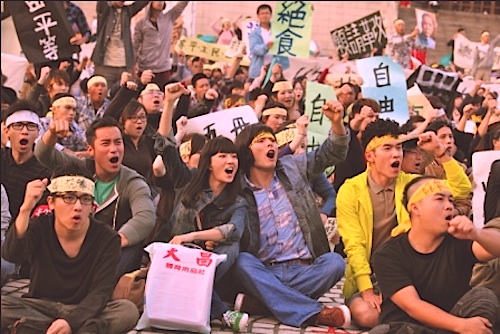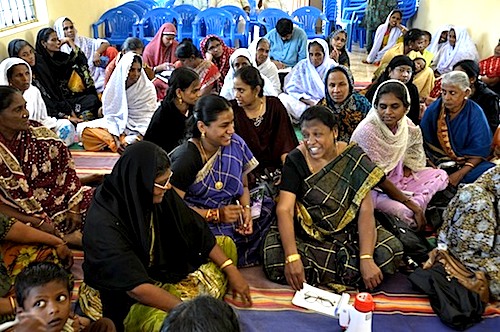
By Joe Bendel. In the 1980’s, student protesters across Taiwan started demanding a more democratic form of government. By 1997, the country functioned much like our own duly elected but media-driven dysfunctional system. While historic events unfold on a macro level, three classmates struggle with their own messily intertwined lives and loves in Yang Ya-che’s Girlfriend Boyfriend—GF BF (trailer here), which opens today in New York.
High school magazine editor Aaron is passionate about Mabel and the democracy movement. She likes him well enough and supports the cause, to an extent, but she really has eyes for Liam. Though he has affection for her too, it is definitely of the “just friends” variety. He pines for Aaron instead, but realizes that simply is not to be. Eventually, Aaron wins Mabel over, at least temporarily, but the three keep in close contact for the next decade or so, which leads to considerable pain and complications for them all. Meanwhile, they watch from the student barricades as political reform sweeps across Taiwan.
Granted, GF BF’s premise certainly lends itself to melodrama, but Yang’s approach to the material is unexpectedly restrained. Frankly, he passes up several golden opportunities for tearjerking. Similarly, he consistently eschews didacticism when depicting the student movement. In fact, the orderly, matter-of-fact manner the film portrays Taiwan’s revolutionary liberalization is rather surprising (and telling).
Nonetheless, GF BF has a wistful air of innocence lost that leaves quite an impression. Cinematographer Jake Pollock’s early candle-lit night scenes are particularly evocative. There is a real sense of time passing in the film, even though its ridiculously attractive cast never seems to age a crow’s foot over a dozen or so trying years.

Who would want to see Gwei Lun Mei age anyway? As Mabel, she vividly projects earnest sensitivity, without degenerating into an emotional basket case. It is a perfect starring vehicle for her. Likewise, Joseph Chang is also a pretty effective tortured slow burner as Liam. However, Rhydian Vaughan never really gets inside Aaron, leaving viewers with the impression of a rather shallow opportunist.
It is hard not to favorably compare the response to the Wild Lily Student Movement with the Tiananmen Square protests just one year earlier, but that is hardly GF BF’s central point. It is sort of like a Taiwanese Jules & Jim, intensified by tumultuous social change and the closeted homosexual dynamic added to their mismatched love story.
Like the lives it presents, GF BF can be a bit unwieldy, but it is consistently engaging viewing and also fascinating as a reflection of current Taiwanese socio-political attitudes. Recommended for those who enjoy a love triangle with a very definite sense of time and place, Girlfriend Boyfriend opens today (8/3) in New York at the AMC Empire and Village 7, as well as in San Francisco at the AMC Metreon and Cupertino Square, courtesy of China Lion Entertainment.
LFM GRADE: B
Posted on August 3rd, 2012 at 11:35am.
